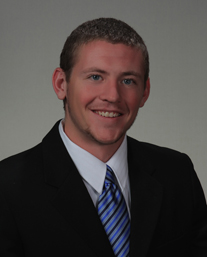Sometimes, a shot in the dark yields luminous results.
Senior Jacob Castilow, a FIJI, understands this phenomenon firsthand. When he arrived at his home in Bluffton, Ind. last winter break, he found a brochure from the University of Virginia’s biophysics doctorate program among the mail that had accumulated while he was away.
A few weeks later, he applied to UVA, where he was later accepted. The technical name for his program is the Structural, Computational Biology, and Biophysics doctorate program, and the graduate school ranking website pgds.org places it in the top 20 biophysics programs in the nation.

“It means I’ll basically do research on proteins and hopefully find cures for things,” he said. “They study the structure of the AIDS virus, the structure of how certain binding factors affect cancer, and how you get those things not to work right. It’s kind of a detailed molecular investigation of how to stop cancer.”
The physics major arrived at his current destination after years of searching for his intellectual passion. He considered medical physics, which would have required him to spend a lot of time running computer programs. He wanted something more hands-on. Castilow said biophysics fit the bill not only because he could apply physics to medicine but also because he could help other people.
“The thing I like about it is it involves biological systems, which includes nature,” said Castilow, who describes himself as “outdoorsy.” “And [nature] is pretty cool because it does things autonomously, like the cells that keep you alive. Our cells do millions upon millions of things every second that are really complicated that we don’t even understand how they work. And yet it’s how we live. It’s how grass grows. It’s how trees grow. It makes up everything. It’s like my religion I guess, the study of nature.”
But Castilow is not just enthusiastic about the prospect of working with biological systems themselves, he is energized by the possibility of helping other people. Research and community service have dominated Castilow’s college life.
During the summer after his freshman year, Castilow worked at Englishton Parks, a campus for at-risk kids. He noted quickly that one cannot simply apply to the camp. One must be recommended.
Many of the children there have trouble interacting in society. Castilow described one student who stabbed his teacher with a pencil as a second grader.
During the summer after his sophomore year, he worked with Physics Professor
James Brown on his modular nuclear array research. And last summer, he conducted nuclear research at the Thomas Jefferson National Lab in Newpoint News, Va. through a program based at Hampton College, a historically black college.
For Castilow, his academic pursuits also incorporate his concern for humanity. At Wabash, he has been involved with Alpha Pi Omega, a service fraternity, and the Society for Physics Students. Even when he went abroad to Aberdeen, Scotland, he volunteered with an organization that helped blind people get involved with the community.
The UVA Ph.D. program is a logical next step for this humanitarian scientist.
“For me, I would like to do some research that is medically related to some prevalent disease,” he said. “I don’t expect to cure it, but I think it’d be satisfying to chip away at the problem, to be part of the upward march of humanity. I think if I need to get up everyday that should be a sufficient reason.
“Maybe millions of people are dying from the disease you’re working on. I think if you’re just human you don’t like to see people suffer. I guess I fell into [science] when I realized I didn’t like to see people cry or get hurt. [I want] to relieve pain, to make life a little easier for people, to do what I can with my short time.”
 “It means I’ll basically do research on proteins and hopefully find cures for things,” he said. “They study the structure of the AIDS virus, the structure of how certain binding factors affect cancer, and how you get those things not to work right. It’s kind of a detailed molecular investigation of how to stop cancer.”
“It means I’ll basically do research on proteins and hopefully find cures for things,” he said. “They study the structure of the AIDS virus, the structure of how certain binding factors affect cancer, and how you get those things not to work right. It’s kind of a detailed molecular investigation of how to stop cancer.”